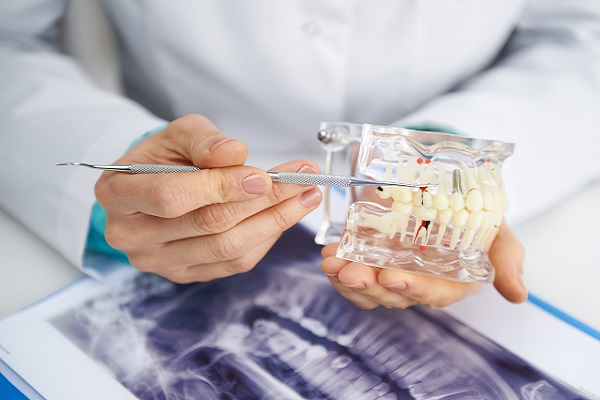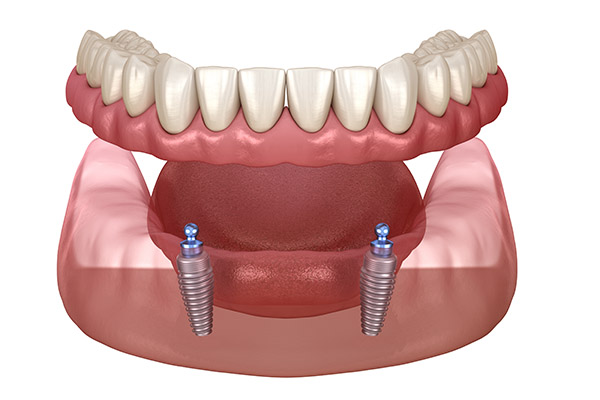How Long Do All-On-4® Implants Last?

One of the concerns many people have regarding All-On-4® dental implants is the longevity of the results. Though the system is a newer one, the available data shows that the prosthetics can last for a significant length of time. That said, how long an individual can expect the implants to last depends on how well that person takes care of them.
Long-term success for All-On-4® dental implants
The longest study on the All-On-4® dental implant system, published in the Journal of the American Dental Association, looked at the survival rate over a 10-year period. The findings of the study revealed that this particular system lasts just as long as, if not longer than, traditional dental implants. At the five-year point, 98% of patients reported continued success. 95% of patients did not experience a single implant failure. At the 10-year mark, the success rate was at 95%, with 94% of patients claiming that not a single implant failed. Shorter studies of five years revealed comparable results.
How to make the implants last longer
Of course, for many patients, the success rate of implants is highly dependent upon how well they are cared for and on oral hygiene habits in general. Below are a few techniques to help expand the lifespan of All-On-4® dental implants.
Choose a dentist with experience
Patients should work with a dentist who has experience placing this advanced implant system. Experienced dental professionals know which techniques to use to avoid the most common causes of implant rejection.
Improve overall health
The mouth is part of the body, and so if the overall body is unhealthy, there is a strong chance the mouth is too. Moreover, conditions that affect the body’s immune system, healing rate or circulation can also impact newly placed dentures. Patients can help ensure the success of the implant system by eating a wholesome diet, maintaining healthy blood sugar levels and increasing blood circulation. In general, leading an overall healthier lifestyle can help decrease the risk of implant failure.
Maintain oral hygiene
Maintaining an adequate oral hygiene routine can go a long way toward ensuring the success of All-On-4® implants. Dentures, like natural teeth, need to be brushed, flossed and rinsed. Patients should also continue to visit the dentist on a biannual basis, or more if that is what the dentist recommends.
Quit bad habits
Smoking, excessive drinking and using the teeth to open packages are just a few bad habits that can damage both natural teeth and implants. Patients who want to increase the lifespan of All-On-4® implants should completely eliminate damaging habits.
Treat grinding
Grinding, like smoking and drinking, can cause irreparable damage to the teeth and jawbone. If a patient unconsciously grinds the teeth, a dentist may try to intervene by recommending grinding treatment, which entails a customized mouthguard the patient can wear at night or during the hours when grinding is most likely to occur.
Conclusion
All-On-4® dental implants were designed to last for a long time. With the right care and treatment, they have the potential to last a lifetime. If you are looking for a natural-looking, comfortable and durable tooth replacement solution, talk to your dentist about All-On-4® today.
Are you considering All-On-4® in the Atlanta area? Get more information at https://atlantapamperedsmiles.com.
Check out what others are saying about our services on Yelp: Read our Yelp reviews.
Recent Posts
Implant overdentures may be the best investment when it comes to options for replacing missing teeth. Although you have many options for replacing missing teeth, implant overdentures may be the right option for you. Implant overdentures are known as “snap-on dentures” because the denture connects to the implant via a snap assembly in which a…
Clear braces have become a popular choice for individuals seeking to straighten their teeth while maintaining a discreet appearance. Both adults and teens now have access to innovative orthodontic treatments that focus on comfort, aesthetics, and effectiveness. If you are considering clear braces for yourself or your child, it is essential to understand how these…
You may need a tooth extraction to improve your oral health. Preserving teeth is the primary goal of dentists. But there are cases when removing the tooth is important in achieving good dental health. Here are the details on when it is necessary for one’s oral health to get a tooth extraction.Tooth extraction may be…
A general dentist will typically only recommend pulling a tooth when absolutely necessary. This procedure, also known as tooth extraction, is reserved for teeth that have been decayed or damaged beyond repair. Not only does this prevent a problem tooth from starting a domino effect of oral health issues, but it also brings several other…


